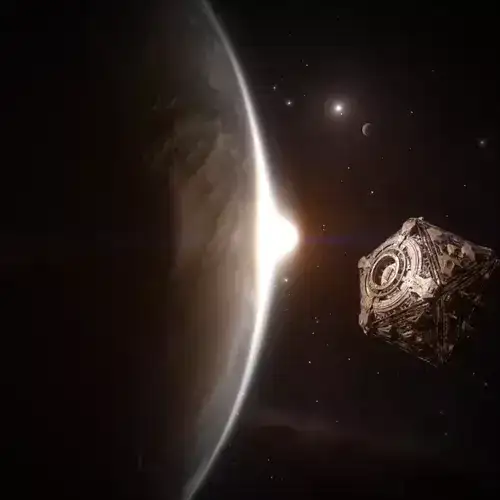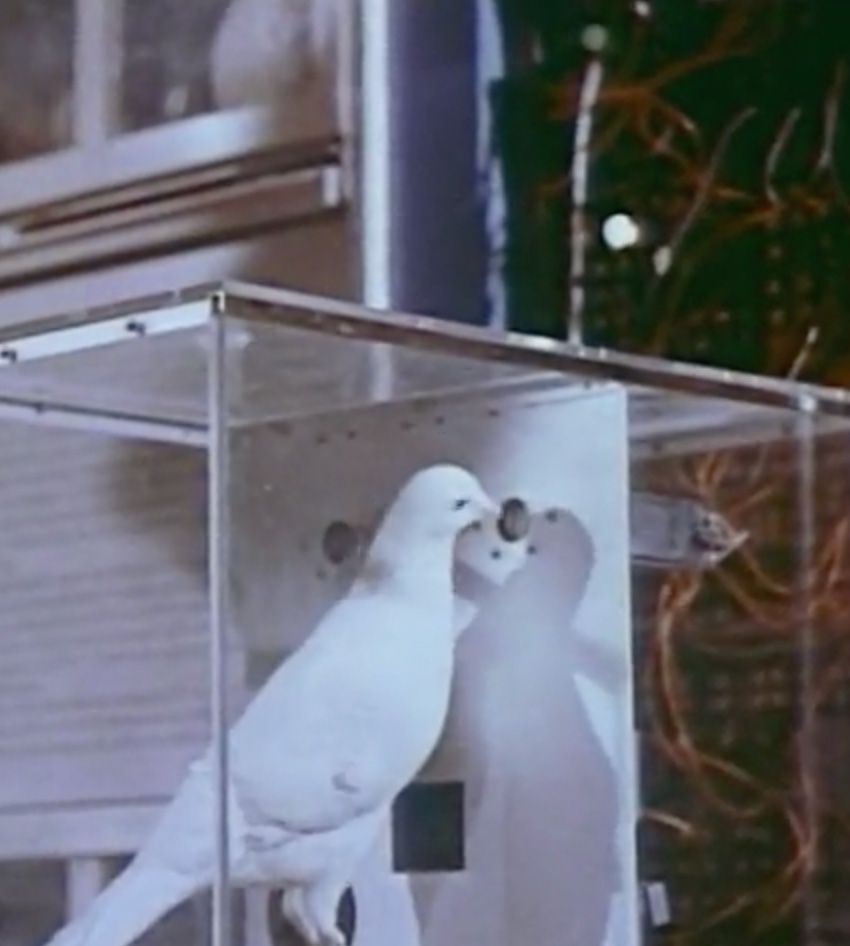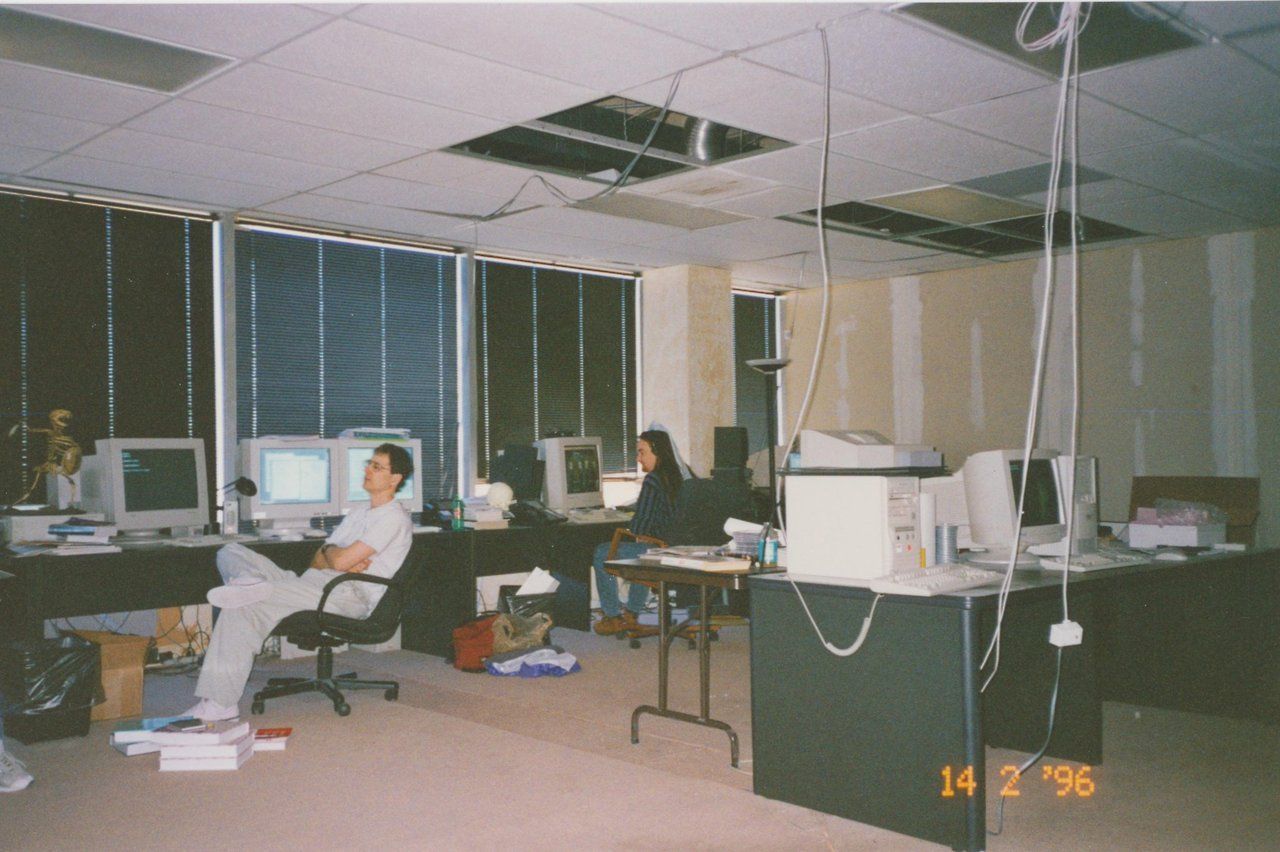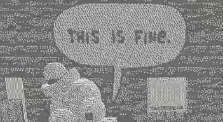Decentralised Networks of Care: The Para-Real as Mutual Aid
00:01:15,000What is the Hologram? The premise is simple.00:01:18,660
00:01:19,080Three people, the Triangle, meet on a regular basis to listen and00:01:23,820 00:01:23,820support the physical, mental, and social health of a fourth00:01:27,510 00:01:27,510person, the Hologram. Years in development, the Hologram had00:01:33,510 00:01:33,510already begun to move and grow before the events of 2020. But00:01:39,510 00:01:39,510its timing could not have been more critical. The Hologram's00:01:45,810 00:01:45,840online work began almost exactly after the moment when the day00:01:51,150 00:01:51,150before became life before. And while we sat minds racing in our00:01:56,970 00:01:56,970homes and thinking and fearing the unthinkable, the Hologram00:02:00,900 00:02:00,900was already in motion. Since then, the Hologram has run00:02:05,820 00:02:05,820countless sessions and more importantly, facilitated three00:02:09,390 00:02:09,390courses aimed at teaching its fundamentals to interested00:02:12,180 00:02:12,180people. Each course has enjoyed surging interest, and these00:02:16,920 00:02:16,920initial participants invite a further three to participate00:02:20,940 00:02:20,940less formally, further widening the community. To the observer,00:02:27,150 00:02:27,180the Hologram can seem awkward, or obtuse, as its practices and00:02:31,830 00:02:31,830community brushes up against flattened surveillance-riddled00:02:35,130 00:02:35,490digital spaces served up by underpowered computing devices.00:02:39,540
00:02:40,560But in its online form, the Hologram is a vivid testimony of00:02:45,330 00:02:45,330the para-real because it is a real, expanding example of00:02:49,530 00:02:49,530resilience of communities when they are placed before the00:02:53,160 00:02:53,160platform. Its practices connect in spite of the tools, and its00:02:58,710 00:02:58,710practitioners use their innate understanding of the gaps in00:03:01,650 00:03:01,650social care, to evaluate, migrate and seize upon these00:03:05,820 00:03:05,820platforms, bending them towards a decentralized network of00:03:10,290 00:03:10,290global, feminist social support. Cassie Thornton, Shawn Chua and00:03:16,860 00:03:16,860Lauren Klein are three members of the Hologram.00:03:19,560
00:03:26,640Cade Diehm: Maybe Cassie, rather than just simply explain the Hologram,00:03:31,290 00:03:31,740maybe we could show it.00:03:32,820
00:03:33,600Cassie Thornton: Oh, good. So we always start any sort of00:03:36,930 00:03:36,930Hologram session with something called the stuck dance, a really00:03:40,200 00:03:40,200simple sort of social technology that we borrowed from social00:03:43,350 00:03:43,350presencing theatre, where we can kind of speak with more than00:03:46,650 00:03:46,650words, and instead of explaining it more than that, I think we're00:03:50,340 00:03:50,340just going to do it. We'll all take a turn doing it and have00:03:53,310 00:03:53,310Cade go last00:03:54,570 00:03:56,000We saw a lot, we saw a lot of work going into a series of00:04:31,580
00:03:56,000Lauren Klein: Kind of subtle, but present, like change in00:04:45,770
00:03:56,030Shawn Chua: I can go through first.00:03:56,900 00:04:31,610states of being that range from really focused and concentrated00:04:36,860 00:04:36,860to really relaxed00:04:38,240 00:04:45,770placement of the body in particular the head, moving kind00:04:49,820 00:04:49,820of back here into something forward.00:04:52,130
00:04:53,840Cade Diehm: We saw something that was quite deliberate.00:04:56,990
00:05:00,000Cassie Thornton: We saw a very preconceived statue or sculpture00:05:36,780
00:05:00,200Shawn Chua: Thank you00:05:00,980 00:05:38,100take form and we saw us stare into the palm of our hand, and00:05:45,000 00:05:45,030almost appear to be looking through it00:05:47,640
00:05:49,950Shawn Chua: That's interesting we saw a reflection coming back00:05:55,350 00:05:55,350through the curve of your hand, actually.00:05:57,990
00:05:59,790Cade Diehm: We saw a rigidity, but from a position of strength.00:06:05,610
00:06:05,610Lauren Klein: I appreciate that. Thank you.00:06:11,280
00:06:28,830Cade Diehm: We saw a center balance. You can see a lot of00:06:35,670 00:06:35,670focus on your feet.00:06:36,720
00:06:39,480Lauren Klein: We noticed the, an opening of the, your hips, with00:06:45,060 00:06:45,060the foot that turned out. Just that sense of openness.00:06:48,390
00:06:49,530Shawn Chua: We saw a solidness through the ways in which you00:06:53,190 00:06:53,190were grounded. And we saw you looking inwards.00:06:59,220
00:07:03,240Cassie Thornton: So Cade's going to go last because Cade's going00:07:05,310 00:07:05,310to be the Hologram.00:07:06,360
00:07:30,420Lauren Klein: We felt, or saw something that felt like00:07:35,310 00:07:35,370enjoyment in putting your body into the position.00:07:39,150
00:07:40,140Shawn Chua: We noticed a softness that was cocooning your00:07:44,520 00:07:44,520face.00:07:45,240
00:07:50,010Cassie Thornton: We, we recognize the pose as being00:07:54,420 00:07:54,420like, like a kind of tired warrior, but like maybe because00:08:00,480 00:08:00,480of a kind of glytchyness on the internet, it was like, it was00:08:05,040 00:08:05,040like an over-caffeinated and tired warrior, and very00:08:08,160 00:08:08,160graceful, also. Like the movement into and out of the00:08:11,220 00:08:11,220shape is very graceful.00:08:12,690
00:08:12,690Lauren Klein: Yeah.00:08:12,750
00:08:18,240Cade Diehm: Thank you.00:08:18,720
00:08:18,750Cassie Thornton: So...00:08:19,110
00:08:19,110Cade Diehm: It is, it's always fun doing that. Yeah.00:08:21,630
00:08:23,790Cassie Thornton: Hmmmm, yeah, it's very fun with, it's very00:08:25,860 00:08:25,860fun with your current character, to do it.00:08:28,620
00:08:29,040Cade Diehm: This must be the first time that's, the the three00:08:31,290 00:08:31,290of your experien- like, done that. It's the first time I've00:08:33,330 00:08:33,330done that in, in this...00:08:35,430
00:08:35,430Lauren Klein: It's awesome.00:08:36,150
00:08:36,510Cade Diehm: ...space, in this body. Ha, ha, ha00:08:40,440
00:08:40,500Lauren Klein: I would comment on my own comment, which is like, I00:08:44,100 00:08:44,100think my comment of seeing enjoyment was projecting my00:08:48,150 00:08:48,150enjoyment of watching. Ha, ha, ha, ha.00:08:49,500
00:08:51,810Cade Diehm: Yeah. What comes next?00:08:54,270
00:08:55,590Cassie Thornton: Since we're kind of acting as your Triangle,00:08:58,230 00:08:58,260we asked you questions. And so in the Hologram, we ask00:09:02,100 00:09:02,100questions from three different positions, either questions00:09:05,640 00:09:05,640about the physical self, the social self, the mental and00:09:09,690 00:09:09,690emotional self. And so we'll do one round of questions for you00:09:13,290 00:09:13,290based on the shape you made in the stuck dance, but also based00:09:16,770 00:09:16,770on whatever you would like to talk about today. So, Cade I'm00:09:21,150 00:09:21,150just wondering if you could mark the task, which means maybe tell00:09:24,720 00:09:24,720us what you'd like to talk about and what kind of feeling you00:09:37,530
00:09:33,750Cade Diehm: I think I'd like to talk about the sense of00:09:36,918 00:09:36,991tiredness and being online for too long. Firstly, in the00:09:41,118 00:09:37,530would like to produce by the end of this interview.00:09:44,970 00:09:41,191context of marking the task, and also the interview itself.00:09:45,539
00:09:45,000Cassie Thornton: So now the three of us are going to ask you00:09:49,230 00:09:49,230just one round of questions. I think we've already decided00:09:53,580 00:09:53,580which roles we're going to take on.00:09:55,950
00:09:56,560Lauren Klein: I'll be asking about physical and physicality.00:10:00,640
00:10:01,710Shawn Chua: And I'll be asking about mental, emotional space.00:10:06,540
00:10:08,070Cassie Thornton: And I'll ask you questions about your00:10:10,110 00:10:10,110relationship to the social.00:10:11,580
00:10:13,770Lauren Klein: So, we were curious about observing us right00:10:20,190 00:10:20,190now, I'm observing the screen. I'm watching you, Cade, and what00:10:26,040 00:10:26,040are we, who are we when we're looking at ourselves, but00:10:29,520 00:10:29,520particularly for you in this moment, I'm curious if you can00:10:34,500 00:10:34,530kind of vision, this space between your physical body and00:10:41,490 00:10:41,490this image of you on the screen. And if there's any, like shape00:10:47,850 00:10:48,120that it takes, like, is there an actual shape, or color or a00:10:52,740 00:10:52,740sensation, or a texture or any, anything that might come up in00:10:56,730 00:10:56,730your brain, in your mind is an image of that.00:10:59,580
00:10:59,930Cade Diehm: There is I think. Maybe the pandemic has made me00:11:04,610 00:11:04,610struggle a little bit with physicality, from a place of00:11:08,060 00:11:08,960being quite isolated, being at high risk. It has meant that00:11:12,500 00:11:12,500I've tried to express myself through a replacement of the00:11:18,560 00:11:18,560physicality, so on, where from my perspective, which you can't00:11:23,000 00:11:23,000see right now, if I open my eyes again, what I can see actually00:11:26,270 00:11:26,270is like, a floating window inside a completely different00:11:31,490 00:11:31,490space. It feels very playful, but at the same time, it feels00:11:36,320 00:11:36,590like there's a big gulf between that and me as sitting here00:11:41,810 00:11:41,810physically.00:11:42,470
00:11:46,640Shawn Chua: I'm curious about you know, earlier, when we were00:11:49,940 00:11:49,940talking about how we were feeling fatigued from being00:11:53,270 00:11:53,300online for so long, and and to think about that, that shape00:11:58,340 00:11:58,340that you were forming, as well, I'm wondering what that embrace00:12:04,190 00:12:04,220might look like, within this flattened space for you.00:12:08,660
00:12:11,360Cade Diehm: Interaction has been a lifesaver, as I think is true00:12:16,040 00:12:16,040for many people this past year. Whenever I've done the stuck00:12:20,750 00:12:20,750dance, I've always played with the feeling of like, the00:12:25,220 00:12:25,520bringing one into oneself, and then sort of pushing out these00:12:29,540 00:12:29,540actions of the personal embrace or like the stretching out, a00:12:32,480 00:12:32,510kind of, these fluidity, these motions that I feel lost as part00:12:38,780 00:12:38,780of the pandemic, everyone's in chairs, or sitting on their00:12:41,720 00:12:41,720laptops in bed, or like these sorts of things, so even these00:12:44,660 00:12:44,660motions of going through and flexing in each direction as00:12:49,040 00:12:49,040part of the stuck dance is a really liberating thing.00:12:51,320
00:12:55,340Cassie Thornton: I have a question that I've been wanting00:12:58,590 00:12:58,672to ask you, ever since I met you, actually. What is your00:13:03,223 00:13:03,304ideal social space? Like, because you have a huge life00:13:07,693 00:13:07,774online, and it's filled with complexity and play and rigor.00:13:12,569 00:13:12,651And then I hear from friends who've hung out with you that00:13:17,364 00:13:17,446you're incredibly fun to hang out with in the world, eating00:13:22,241 00:13:22,322pizza, playing with animals. Like, what your ideal social00:13:26,955 00:13:27,036life will be, and like how you'll go towards that.00:13:31,100
00:13:31,000Cade Diehm: I think dynamism is what's missing. I think that's00:13:34,487 00:13:34,557what draws me into why I'm so allergic to the flattening that00:13:38,812 00:13:38,882we've just talked about. I think the playfulness that you've00:13:43,067 00:13:43,137described, which is also, thank you, it's, uh, kind of terrible00:13:47,531 00:13:47,601with compliments, sorry. But I really enjoy spending just time00:13:51,926 00:13:51,995and dynamic spaces. Always changing; always moving. Not00:13:55,832 00:13:55,902necessarily always consuming always, like easily bored or00:13:59,878 00:13:59,947anything like that. But rather, it's the experimentation and00:14:04,133 00:14:04,202the, the connectivity with others I find really joyful. I00:14:08,178 00:14:08,248see myself a little bit more trying to mix the two, right,00:14:12,294 00:14:12,364spending more time traveling around and also bringing people00:14:16,549 00:14:16,619into these spaces, in a sense, trying to do both. Portability,00:14:20,943 00:14:21,013I think is a really important thing right now. Even just those00:14:25,338 00:14:25,408it's three questions, and I already feel like there's a like00:14:29,593 00:14:29,663a huge weight has been lifted up from me. This is, this is really00:14:34,197 00:14:34,266great. I really appreciate taking the moment with me to, to00:14:38,382 00:14:38,452demonstrate this. I feel like it's far more interesting to do00:14:42,707 00:14:42,776it and try to just run a video or something like that. So I00:14:46,892 00:14:46,962really appreciate that. I would like to drop out of this a00:14:51,007 00:14:51,077little bit, and I'd like to start by asking I think what's00:14:55,123 00:14:55,193probably on a lot of viewers minds now. Like, what did we00:14:59,169 00:14:59,238actually just do then? What is this?00:15:01,750
00:15:01,000Cassie Thornton: This was like a very short snippet of like an an00:15:04,214 00:15:04,281online, peer to peer social protocol called the Hologram.00:15:08,098 00:15:08,165Actually, it comes from crisis, it's like, it's like a project00:15:12,317 00:15:12,384born out of crisis. So I am an anti debt activist. I've spent00:15:16,469 00:15:16,536so many years looking at the horrible reality that's produced00:15:20,621 00:15:20,688by an indebted society or a society that is built around00:15:24,438 00:15:24,505debt. Those structures of debt make reality so boring. It means00:15:28,724 00:15:28,791that our imaginations are so plugged into, like the bills we00:15:32,809 00:15:32,876have to pay or the things we feel we owe, and all the guilt00:15:36,827 00:15:36,894and shame around that. And so the Hologram project is based on00:15:41,046 00:15:41,113work that was done in Greece, during a financial crisis, that00:15:45,198 00:15:45,265was also a migrant crisis. The Hologram comes out of an idea00:15:49,283 00:15:49,350that like in crisis, we can really still play with how we00:15:53,167 00:15:53,234use our labor, how we distribute care. And a lot is possible,00:15:57,319 00:15:57,386using the skills we already have, the skills and00:16:00,601 00:16:00,668relationships we already have. I've taken something which was00:16:04,753 00:16:04,820really conceptual over the last few years, which I would have00:16:08,905 00:16:08,972described as para-fictional. And we've made it into like a00:16:12,856 00:16:12,923really, really real set of practices that you can do00:16:16,405 00:16:16,472online. And...00:16:17,410
00:16:18,419Shawn Chua: I think to me, it's, it's a kind of, the way that00:16:21,955 00:16:22,027I've experienced it, it felt like a different dimension. But00:16:26,357 00:16:26,429I find it being described as a kind of social technology that00:16:30,831 00:16:30,903helps to offer a space for a kind of structured experience.00:16:35,161 00:16:35,233And it gave me the tools to distribute the labor of support00:16:39,490 00:16:39,563and care that's given to somebody, right? Because I think00:16:43,676 00:16:43,748oftentimes, with with care work, we often think about very dyadic00:16:48,439 00:16:48,511structures, where it's just one person who is the person who is00:16:53,057 00:16:53,129taking care of us. But I think with, with Hologram, I had the00:16:57,531 00:16:57,604opportunity to begin experimenting with, you know,00:17:01,212 00:17:01,284what happens if the people who were supporting me were also00:17:05,542 00:17:05,614themselves being supported, right, that kind of Triangle00:17:09,655 00:17:09,727structure allows for a space that breaks beyond this two00:17:13,768 00:17:13,841person dyad and opens that space up in quite a, an important way.00:17:18,531 00:17:18,603I feel.00:17:19,109
00:17:19,000Lauren Klein: I think the thing that feels really strong about00:17:22,308 00:17:22,377it, you know, the question that I know that different cohorts00:17:26,582 00:17:26,650had different kinds of questions as the entry into the Hologram,00:17:31,062 00:17:31,131and the question that I received was, like, how do you ask for00:17:35,404 00:17:35,473care? What makes it so hard to ask for care? That feels really,00:17:39,816 00:17:39,884really important. And as Shawn was saying, it is this kind of00:17:44,089 00:17:44,158like distributed sense of not, it not being too weighty,00:17:48,018 00:17:48,087weighty or heavy, but also just this idea of perspective. And I00:17:52,429 00:17:52,498think there's just like, way of visualizing the Hologram that's00:17:56,841 00:17:56,910like, it's the perspective of, of three people, so you get to00:18:01,114 00:18:01,183see yourself and kind of work on whatever you're working on00:18:05,250 00:18:05,319within yourself and your own, your own shape and sphere from00:18:09,454 00:18:09,523these different perspectives. And also, knowing that those00:18:13,521 00:18:13,590perspectives are being informed by a whole network of00:18:17,243 00:18:17,312perspectives as well.00:18:18,760
00:18:19,530Shawn Chua: The way that it starts is that you know, you you00:18:22,080 00:18:22,080approach, um, three people to be your Triangle, and you kind of00:18:27,150 00:18:27,150enter this Triangle and say, as the Hologram, and as the00:18:31,980 00:18:31,980Hologram, you are an expert. You, you're an expert in your00:18:35,970 00:18:35,970own health and how you wish to be cared for. Right? And your00:18:39,480 00:18:39,480Triangle would be, they could be people and your friends network,00:18:43,140 00:18:43,140they could be strangers, they could be anybody, and, and I00:18:47,730 00:18:47,730guess what you seen earlier. Each of those people would be00:18:51,390 00:18:51,390asking questions, someone will be asking about your, your00:18:54,690 00:18:54,720psychological health, someone will be taking care of your00:18:56,820 00:18:56,820social health, and someone will be taking care of your physical00:18:58,860 00:18:58,860health. But I think what's most interesting about this structure00:19:02,220 00:19:02,220so so that at the end of this experience, it doesn't quite00:19:06,810 00:19:06,810stop there. But the idea is that this model tessellates, right?00:19:10,650 00:19:10,650So what that means is that each of your Triangles, which will00:19:13,680 00:19:13,680then be supported by their own Triangle, as well. So that that00:19:18,870 00:19:18,930that viral network that Cassie spoke of earlier, I think is one00:19:22,110 00:19:22,110of the, I think it's very important dimension of this00:19:25,470 00:19:25,470project, or this infrastructure that we are kind of developing.00:19:28,620
00:19:30,180Cade Diehm: So it seems very simple, right? But it's actually00:19:32,460 00:19:32,460quite an interesting, decentralized model. And what's00:19:35,970 00:19:35,970the feedback that you've seen from that?00:19:37,230
00:19:37,000Lauren Klein: I think that, I think it's, I mean, it's00:19:40,930 00:19:40,930definitely ever-evolving. And I think for different people, the00:19:44,260 00:19:44,290outcomes would be different, but I can say like, now this this is00:19:49,030 00:19:49,180based on uh uh, as I said, it changes a lot, but I think00:19:52,930 00:19:52,930there's a sense of like rest because there is an actual00:19:57,670 00:19:57,670structure. So I know that some people, you know, we have a00:20:01,900 00:20:01,900community of practice and then some. So this is just like we00:20:04,960 00:20:04,960have a meeting and people who are interested in the Hologram00:20:08,230 00:20:08,230or who are practicing the Hologram or contributing in any00:20:10,630 00:20:10,630way can just talk about their experience of the Hologram. And00:20:15,520 00:20:15,550I know that for some people, there's nervousness about00:20:20,050 00:20:20,050participating, like, "Oh, can I be what needs to be? Right? Can00:20:24,820 00:20:24,820I be the can I be that this person needs help from. "00:20:29,410
00:20:28,980Cade Diehm: It's a lot of responsibility.00:20:29,670
00:20:29,460Cassie Thornton: The feedback is super interesting, and how it's00:20:32,459 00:20:32,522changed over time. Because before the pandemic, that the00:20:36,096 00:20:36,159general answer was that, like, this is an amazing idea that00:20:39,924 00:20:39,988will never work, and I have no time for it. And then when we00:20:43,816 00:20:43,880began, during the pandemic, at the very beginning, there was a00:20:47,836 00:20:47,900lot of feedback, which was like, "This is amazing, I really want00:20:51,984 00:20:52,048to try it, but I'm so afraid or like, I don't actually, I don't00:20:56,068 00:20:56,132believe that it's possible to do this with people who I know00:20:59,960 00:21:00,024like, I can never ask people I know for their support, because00:21:03,980 00:21:04,044they're too, I don't know, they're too exhausted, they're00:21:07,681 00:21:07,745too spent. They're too sick. I can't do it." And then there's00:21:11,637 00:21:11,701like a layer, which is like, "I can't do this, because I can't00:21:15,657 00:21:15,721receive something without reciprocating something of equal00:21:19,422 00:21:19,486value." So the Hologram has a different form of reciprocation,00:21:23,442 00:21:23,506as as Shawn was explaining, and so it's like, "No, I can't do it00:21:27,589 00:21:27,653without an equal exchange." And over time, like those, that00:21:31,418 00:21:31,482feedback has worn away, it's gotten easier and easier for,00:21:35,183 00:21:35,246not for everybody, but for many people, to actually like, get00:21:39,139 00:21:39,203through those barriers and try it. Though, it's still it's00:21:42,903 00:21:42,967still challenging. And I think many people it's like, it's00:21:46,668 00:21:46,732like, there's a lot of barriers to beginning because of some of00:21:50,752 00:21:50,816those, those things in the assumptions that are underlying them.00:21:54,900
00:21:54,000Cade Diehm: The structure, the structure of the Hologram really00:21:57,039 00:21:57,098gives it that kind of permission, right? Because it00:22:00,137 00:22:00,197allows explore what they need to explore that then having the,00:22:03,891 00:22:03,951there's a structure there that can then allow those people to00:22:07,586 00:22:07,645reach out in the same way or not, is a really powerful tool.00:22:11,221 00:22:11,280I'm interested, and maybe this is a reflection of, from each of00:22:15,034 00:22:15,094you, like that moment where it came into this space of like the00:22:18,848 00:22:18,908clashing of technologies, situation, and, and physicality00:22:22,304 00:22:22,364of people, and what that meant for you. It's something I think00:22:26,058 00:22:26,118that's core to the Hologram's struggles and it's successes,00:22:29,634 00:22:29,693right? So I'd be keen to hear about that from each of you.00:22:33,150
00:22:34,170Cassie Thornton: When you invited us and kind of described00:22:36,948 00:22:37,015your orientation to the para-real, it was a big relief00:22:40,674 00:22:40,742to me because I had been from the beginning of the project00:22:44,672 00:22:44,740struggling with two different ideas and sets of languages. So,00:22:48,941 00:22:49,008first, I explained the Hologram as a mytho-real project, but00:22:53,074 00:22:53,142that was coming from a place where there was like, there, it00:22:57,207 00:22:57,275was more likely to get people to kind of like perform it than to00:23:01,611 00:23:01,679actually use it. And then I went more towards like, like thinking00:23:06,083 00:23:06,151about as parafiction and parafiction being like, my00:23:09,607 00:23:09,675favorite example of parafiction is like if you, well, Occupy00:23:13,740 00:23:13,808Wall Street, you know, the park was, had 20 people in Zuccotti00:23:18,009 00:23:18,077Park, somebody makes an image where there's 400 people in00:23:21,939 00:23:22,006Zuccotti Park, puts that on the internet, and now 400 people00:23:26,072 00:23:26,140come because as humans, like, we follow what we believe is real00:23:30,408 00:23:30,476and material, and we follow other humans. And so with the00:23:34,338 00:23:34,406Hologram for so long, it was a beautiful lie. I was like, "yes,00:23:38,675 00:23:38,743it's a huge network of people that are practicing," with the00:23:42,808 00:23:42,876idea that eventually that will become something that was true.00:23:47,077 00:23:47,145And then I think by the time you approached us with the idea of00:23:51,413 00:23:51,481para-real, we had actually already produced a world. And it00:23:55,479 00:23:55,547was real. And it was parallel, like, like what Shawn had said00:23:59,680 00:23:59,748before, it's like, we do actually, when we, when we do00:24:03,406 00:24:03,474this project, I don't even want to call it work. When we do the00:24:07,743 00:24:07,811project, we are participating in the kind of parallel reality00:24:11,944 00:24:12,012that has slightly skewed rules, a softness, a relaxation, the00:24:16,145 00:24:16,213way that Lauren described it, I think, because there's a very00:24:20,346 00:24:20,414formal structure to lean into, because we all sort of like have00:24:24,682 00:24:24,750been trusting this structure for a while, and there's now like00:24:28,951 00:24:29,019many people practicing it, who all know each other who also00:24:33,017 00:24:33,084work on the project.00:24:34,440
00:24:34,000Shawn Chua: I mean, this is, this was a, it's a fascinating00:24:37,047 00:24:37,112question, right? Because, as I mentioned, my first encounter00:24:41,002 00:24:41,067with the Hologram happened at 4am in Singapore. It was quite00:24:44,957 00:24:45,022fascinating because I found myself, you know, every weekend00:24:48,848 00:24:48,912this ritual from 1am to 4am. Being beautifully intimate and00:24:52,738 00:24:52,803profoundly connected with a group of people who, a year on,00:24:56,628 00:24:56,693I realize it's so uncanny that even though, we are so, we know00:25:00,713 00:25:00,778each other so profoundly, I can't just like meet them for00:25:04,474 00:25:04,539coffee or drink, or give them a hug. And that's something that00:25:08,559 00:25:08,623I'm still in the process of trying to negotiate. One, one00:25:12,384 00:25:12,449thing that I didn't remember was, after each of these zoom00:25:16,210 00:25:16,274calls, right, there was almost like an emotional crash that00:25:20,100 00:25:20,165happens, after these three very intense hours being very00:25:23,796 00:25:23,860connected in all these ways over zoom, that moment, when you turn00:25:28,075 00:25:28,140off the zoom, and you are on your own in the room, wherever00:25:31,965 00:25:32,030you are in the world, and that that disenchantment was a, it00:25:35,920 00:25:35,985was a very marked one, right? How does that version of myself00:25:39,940 00:25:40,005that exists in that zoom session, in that Hologram world,00:25:43,701 00:25:43,766how do I reconcile that version of myself in the current reality00:25:47,916 00:25:47,980that I'm existing in? I think that it becomes a much longer process.00:25:52,390
00:25:53,620Cade Diehm: There's a, there's a school of thought that suggests00:25:55,600 00:25:55,600that communities are formed by you build a tool, and then a00:26:00,190 00:26:00,190person comes for the tool and they stay for the community. The00:26:03,520 00:26:03,520Hologram itself is a space where you come for the community, and00:26:07,210 00:26:07,210then you stay for the tool. What is it like to build this kind of00:26:10,570 00:26:10,570community? Which really doesn't have a set of tools associated00:26:14,140 00:26:14,140like software tools or infrastructure tools associated00:26:16,870 00:26:16,870with it, it's kind of an agnostic from that.00:26:18,790
00:26:18,870Cassie Thornton: We ended up with a set of really structured00:26:23,970 00:26:23,970like, practices and ideas, and a group of people that really00:26:28,290 00:26:28,320understand them, because I think we learned, we learned together00:26:32,880 00:26:32,910as we worked together. And so the technological tools were00:26:38,190 00:26:38,190secondary to like the sort of social system and social network00:26:41,850 00:26:41,850that we produced. The challenge of the moment is seeing like,00:26:46,230 00:26:47,070how we can hold all of those things, as we move platforms and00:26:52,860 00:26:52,860become a bit, a bit more specific or a bit more00:26:56,280 00:26:56,280deliberate about the technology that we use? How do we kind of00:26:59,910 00:26:59,910like, like, bring everybody from one dimension of begged,00:27:03,720 00:27:03,720borrowed and stolen technology to one that's actually like, a00:27:07,890 00:27:07,890safe, carefully constructed space that's made for the work00:27:12,660 00:27:12,660that we want to do? All of the the social technology and the00:27:15,990 00:27:15,990actual social network that has come together around it, I don't00:27:21,960 00:27:21,960think it matters so much what technology we use. I mean, I00:27:26,520 00:27:26,520think there's things that we're all interested in concerned00:27:29,220 00:27:29,220about, like around surveillance and not wanting to participate00:27:32,610 00:27:32,640in like a top, like toxic top down corporate surveillance. And00:27:38,910 00:27:38,940also, I think, like what we've produced can exist in many, many00:27:44,130 00:27:44,130different situations that we will, all the people that use,00:27:47,100 00:27:47,100it will practice it wherever we go. So that can be online or00:27:50,160 00:27:50,160offline, and we'll have to constantly build or find new00:27:53,790 00:27:53,790tools as we grow and change. But, it's never I don't think it00:27:58,350 00:27:58,350will ever be dependent on a specific technology.00:28:01,080
00:28:01,410Shawn Chua: Oh, sure. I just wanted to add on to that point,00:28:03,930 00:28:03,930because I think when when Cassie's talking about the kind00:28:06,990 00:28:06,990of social infrastructure, I think this is not just a kind of00:28:10,170 00:28:11,250rhetorical thing, but it's actually a very real00:28:15,000 00:28:15,030infrastructure, right? I remember once, right, we00:28:19,170 00:28:19,200basically did the Hologram over Zencastr, for example. So it was00:28:23,700 00:28:23,700all purely audio, because we realize we're sick of that kind00:28:28,200 00:28:28,200of visual exhaustion of having to stare at the screen., and00:28:32,250 00:28:32,250because, so because that social infrastructure is so clear,00:28:35,280 00:28:35,280because that's that, for me is the technology of the Hologram,00:28:38,460 00:28:39,450whatever platforms it, it's contained within it simply, you00:28:44,490 00:28:44,490know, the different avatars in which the Hologram is taking00:28:47,040 00:28:47,190shape as.00:28:48,090
00:28:48,270Lauren Klein: Yeah, and I feel like the technology can be like00:28:51,630 00:28:51,720opening more spaces for different kinds, different00:28:54,450 00:28:54,450expressions of the Hologram within the community.00:28:57,510
00:28:57,990Cade Diehm: It seems as though there's a component of a to00:28:59,820 00:28:59,820where the drive for this kind of decentralized care and the need00:29:03,630 00:29:03,630for it has helped. It does seem like there's a willingness there00:29:06,720 00:29:06,720as well, like a almost like a fearlessness. I mean, I can say00:29:10,470 00:29:10,470from what I've seen, there's a willingness to try things with00:29:15,000 00:29:15,030technologies that people otherwise would be very fearful00:29:17,880 00:29:17,880of.00:29:18,240
00:29:19,290Cassie Thornton: Hmmmm, I mean, we have many, I mean, I would00:29:21,990 00:29:21,990say, we have many people that have taken the course who are00:29:26,130 00:29:26,370grandmother age and who like never have really zoomed outside00:29:33,870 00:29:33,870of like to see their family or whatever, so there's a ton of00:29:36,960 00:29:36,960willingness. I think that because the feeling, the feeling00:29:40,230 00:29:40,230produced when we do practice, the Hologram is so good, like00:29:44,940 00:29:44,940it's actually worth it to them to do it, it's gonna it's gonna00:29:48,420 00:29:48,420leave some people out and we need to just, you know, work00:29:50,640 00:29:50,640extra hard to make sure that it remain super accessible and that00:29:54,870 00:29:54,870we can be maybe the bridge that helps people try new stuff.00:29:58,140
00:29:58,890Cade Diehm: And there's not many projects like this, right? Like00:30:00,930 00:30:00,930a fully decentralized space of care, that transcends the00:30:07,860 00:30:07,860tooling of which it's dependent upon? Where does it go from00:30:12,540 00:30:12,540here?00:30:12,780
00:30:12,810Lauren Klein: I mean, I will just say like, I have so many00:30:17,310 00:30:17,340visions of what it could be, there could be like an urgent00:30:21,240 00:30:21,240care Hologram. So there's a network of people that you could00:30:24,330 00:30:24,330just access and ask for a Triangle experience, and then00:30:27,720 00:30:27,720like do that. There could be a way to create spaces where you00:30:34,980 00:30:35,010can access people who have specific knowledge. I don't00:30:37,950 00:30:37,950know. These are just fantasies, like little things that come out00:30:40,890 00:30:40,890of, curiosities that come up. I mean, there's so much to say, I00:30:46,170 00:30:46,170will, I won't take long.00:30:47,670
00:30:47,700Shawn Chua: I think for myself, it's mutation. I think we talked00:30:51,630 00:30:51,630about how, you know, the Hologram is kind of viral00:30:53,760 00:30:53,760network and viruses, the mutate, right, because they, they are so00:30:57,870 00:30:58,020volatile. And I think because this this network is it's00:31:01,320 00:31:01,350peer-to-peer, it's so decentralized, it affords a lot00:31:04,980 00:31:04,980of different kinds of mutations to happen. You know, what does00:31:07,800 00:31:07,800it, what kind of shapes does it need to take? Yeah, or different00:31:10,590 00:31:10,590kinds of frames, right, that these are scaffolds, so that the00:31:13,290 00:31:13,290Hologram could kind of latch on and find different shapes in its00:31:16,500 00:31:16,500manifestation. So yeah, that kind of proliferation, viral00:31:19,950 00:31:19,950proliferation, and mutation is where I hope it goes.00:31:22,350
00:31:23,050Cassie Thornton: One really specific, like practical use00:31:26,380 00:31:26,380that I would love to see would be for decarceration. Like I00:31:30,490 00:31:30,490would love if the Hologram could pair with, you know, an00:31:34,120 00:31:34,120organization like critical resistance or something that00:31:36,100 00:31:36,100does abolitionists work. And like, actually, I think helps00:31:40,270 00:31:40,300anyone that's stuck in a carceral system, leave. All of00:31:44,320 00:31:44,320the situations I've been in have been very flawed, because they00:31:47,290 00:31:47,290rely on individual support, and I've never been able to give the00:31:52,030 00:31:52,030support I would like to give that could sustain somebody00:31:54,160 00:31:54,160through a real life transition, like decarceration. And I mean,00:31:57,010 00:31:57,040I'm interested in all kinds of decarceration, like, so from00:32:00,580 00:32:00,580psychological institutions, to, you know, all kinds of things.00:32:04,150 00:32:04,150But, so I think, like, having it be known as a tool for hardcore00:32:09,640 00:32:09,640transformation. And I think the thing about it that I think is00:32:12,910 00:32:12,910so important is that, like, when somebody's making a big00:32:15,880 00:32:15,880transformation, and you want to support them, three people00:32:19,810 00:32:19,810supporting one person is much more likely to work. You also00:32:23,890 00:32:23,890then as a supporter, have support. Because the thing that00:32:28,090 00:32:28,090you need to hold in supporting someone's transition is like,00:32:32,140 00:32:32,320it's a lot. And I think recognizing the importance of00:32:38,230 00:32:38,230supporting supporters is like, so relevant to this type of00:32:41,560 00:32:41,590thing, transformational work. And generally, I just think if00:32:44,440 00:32:44,440like, you know, if it I just think we need to develop tools00:32:48,490 00:32:48,490that can become really, really easy to access for lots of00:32:52,390 00:32:52,390different types of people, so they can take it, and do what00:32:54,700 00:32:54,700Sean saying, and mutate it and make it their own. Like it's00:32:57,280 00:32:57,280really, it's an anarchist project that's completely00:33:00,490 00:33:00,490drowned in structure so that in this moment where everything is00:33:03,550 00:33:03,550so fluid and breaking down and soft, we can have a little shape00:33:08,230 00:33:09,430to move with. But, you know, I hope so much that we can just00:33:12,970 00:33:13,120spread that structure around and then see what other people do00:33:17,410 00:33:17,410with it in a really vast way.00:33:20,470
00:33:20,710Cade Diehm: Shawn, Lauren, and Cassie, this is a project with a00:33:24,340 00:33:24,340core community of 60 and an extended community of hundreds00:33:28,150 00:33:28,360existing across the world for decentralized care in a time of00:33:32,620 00:33:32,650absolute crisis. The website for it is thehologram.xyz. Thank you00:33:37,840 00:33:37,840very much. Yeah, this is a really important project.00:33:40,570
00:33:41,440Lauren Klein: Thank you. This was fun.00:33:42,460 00:33:42,490I feel excited.00:33:43,360
00:33:45,160Cade Diehm: Thanks.00:33:45,550
00:33:46,320Shawn Chua: Thank you so much00:33:47,190






